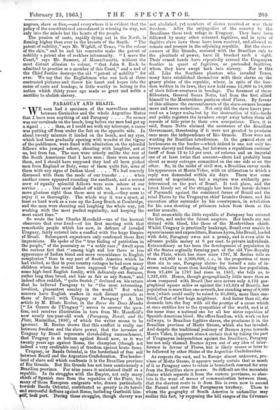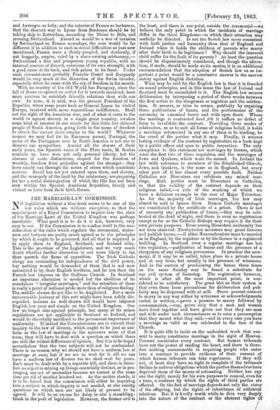PARAGUAY AND BRAZIL.
" laTE soon had specimen of the marvellous contrast V' V- between Corrientes and the whole Argentine States that I have seen anything of and Paraguay . . . . No sooner was our cavalcade on the beach, long before our men had got up a signal . . . . than, as I could see with my telescope, a canoe Was putting off from under the fort on the opposite side. In about twenty minutes it landed on the beach, and my eyes, which had been gradually opening with wonder at the vigour of the paddlemen, were fixed with admiration on the splendid fellows who jumped ashore, shouting with laughter, not at us, but from fun. The men were utterly unlike the rest of the South Americans that I have seen : there were seven of them, and I should have supposed they had all been picked men from England or Italy, some of them quite fair, none of them with any signs of Indian blood . . . . We had scarcely discussed with them the mode of our transfer . . . . when another canoe appeared rounding the sandbank, and a second crew of equally splendid fellows were soon ashore at our service . . . . Oar crew dashed off with us. I never saw a more glorious sight than these men at work,—they seem to enjoy it so thoroughly. The whole way it was a spurt, at least as hard work as a race up the Long Reach at Cambridge, and the men were shouting and laughing the whole way, yet working with the most perfect regularity, and keeping the most exact time."
So wrote the late Charles Mansfield—one of the keenest observers that ever lived—of his first meeting with that remarkable people which has now, in defence of invaded Uruguay, fairly entered into a conflict with the huge Empire of Brazil. Subsequent experience only confirmed these first impressions. He spoke of the "true feeling of patriotism in the people," of the peasantry as "a noble race ;" dwelt upon the curious fact that "among high and low there is less appearance of Indian blood and more resemblance to English complexion" than in any part of South America which he had visited, so that in poor country cottages he had seen many children whom he would have supposed "the offspring of some high-bred English family, with delicately-cut features, rather long than broad, and hair as fair as any Saxon," and indeed often reddish, "quite Scotch ;" declared on his return that he believed Paraguay to be "the most interesting, loveliest, pleasantest country in the world." But what concern have English readers in such distant quarrels as those of Brazil with Uruguay or Paraguay ? A late article by M. Elisee Reclus, in the Revue des Dear Mondes (" La Guerre de l'ilruguay ") serves to answer the ques- tion, and receives illustration in turn from Mr. Mansfield's now nearly ten-year-old work (Paraguay, Brazil, and the Plate, Macmillan, 1856), of which the writer seems to be ignorant. M. Reclus shows that this conflict is really one between freedom and the slave power, that the invasion of Uruguay by Brazil represents slaveholding encroachment, that Uruguay is at bottom against Brazil now, as it was twenty years ago against Roses, the champion (though not indeed a very creditable one) of freedom against brute force. Uruguay, or Banda Oriental, is the borderland of free soil between Brazil and the Argentine Confederation. The border- land of slave soil which confronts it is the Brazilian province of Rio Grande. But Rio Grande has not been continuously a Brazilian province. For nine years it maintained itself as a republic. In its struggles with the Empire, not only many chiefs of Spanish race from the republics of the Plate, but many of those European emigrants who, drawn particularly towards Banda Oriental, contributed so greatly to its heroic and successful defence against Roses, including Garibaldi him- elf, took part. During those struggles, though slavery was not abolished, yet numbers of slaves received or won their freedom. After the subjugation of the country by the Brazilians these took refuge in Uruguay. They have been. followed by many other coloured fugitives, and in spite of fugitive slave laws these have been received, and allowed to remain and prosper in the adjoining republic. But the slave- owners of Rio Grande, restored with the Brazilian rule to the plenitude of power, have ill brooked such a sight. Their armed bands have repeatedly crossed the Uraguayan frontier in quest of fugitives, or pretended fugitives, whom they have swept back into slavery. Nor is this all. Like the Southern planters who invaded Texas, many have established themselves with their slaves on the grassy plains of the republic, where, in spite of the free- dom written in its laws, they now hold some 15,000 to 18,000 of their fellow-creatures in bondage. The foremost of these filibusters, General Souza Netto, had from the first allied himself to the Montevidean partizan chief Flores. By favour of this alliance the encroachments of the slave-owners became more and more audacious. Not only did the slave hunts pro- ceed on a larger scale, but by the destruction of title-deeds- and public registers the invaders swept away before them all records of title prior to their own usurpations. Then, it is- said, Souza Netto claimed the assistance of the Brazilian Government, threatening if it were not granted to proclaim once more the independence of Rio Grande. Pleas were not wanting for Brazilian interference. In the general state of lawlessness on the border—which indeed is one not only be- tween slavery and freedom, but between a republican customs' tariff of from 12 to 15 per cent. ad valorem and an imperial one of at least twice that amount—there had probably been about as many outrages committed on the one side as on the other. So, in the midst of civil war, a Brazilian envoy made his appearance at Monte Video, with an ultimatum to which a reply was demanded within six days. There was some- amount of negotiation, but a rupture was evidently pre- determined on the part of Brazil. It took place, and the latest bloody act of the struggle has been the heroic defence of Paysandii against the combined forces of Brazil and the rebel Flores by the Uruguayan chief Leandro Gomez, and his execution after surrender by his countrymen, in retaliation for his own shooting of prisoners taken from them at the earlier assaults.
But meanwhile the little republic of Paraguay has entered the lists, and under the fairest auspices. Her hands are not stained with blood, like those of the Montevidean chiefs. Whilst Uruguay is practically bankrupt, Brazil ever unable to square income and expenditure, B uenos Ayres, likeBrazil, loaded with debt, Paraguay owes not a penny, and is even able to advance public money at 6 per cent. to private individuals.. Extraordinary as has been the development of population in all the States orginally forming part of the old Vice-Royalty of the Plate, which has risen since 1797, M. Reclus tells us from 443,000 to 3,000,000, 1. e., in the proportion of more- than six to one, Paraguay claims for herself a rate of in- crease actually more than doubling this, since her population,. from 97,480 in 1797 had risen in 1857, she tells us, to 1,337,439. Hence, though geographically little more than an atom compared with Brazil (her area covers only 4,132 geo- graphical square miles as against the 147,624 of Brazil), her population is more than one-seventh, her standing army of 8,000 , men (which could easily be raised to 30,000), more than one- third, of that of her huge neighbour. And better than all, she descends, into the fray with all the prestige of a cause which at once entitles her to the sympathies of the world, and is at the same time a national one for all her sister republics of Spanish-American blood. She offers freedom, with work on her railways, to Brazilian fugitive slaves, she proclaims it in the- Brazilian province of Matto Grosso, which she has invaded. And despite the traditional jealousy of Buenos Ayres towards. Monte Video, it appears almost certain that by taking the part of Uruguayan independe'nce against the Brazilians, Paraguay has not only shamed Buenos Ayres out of any idea of inter- ference in favour of Flores, but is likely sooner or later to be followed by other States of the Argentine Confederation.
As respects the vast, and to Europe almost unknown, pro- vince of Matto Grosso, it appears nearly certain that as much of it as Paraguay cares to retain is henceforth rescued for ever from the Brazilian slave power. So difficult are the mountain chains which separate it from the eastern provinces, so abso- lute is the want of means of communication between them, that the shortest route to it from Rio is even now to ascend the Parana and cross the Paraguayan territory. Those to- whom the geography of South America is unfamiliar may -realize this fact, by supposing the hill ranges of the Ce'vennes. and Auvergne so lofty, and the interior of France so barbarous, that the shortest way to Lyons from Bordeaux should be by taking ship to Rotterdam, ascending the Rhine to Bile, and crossing Switzerland. Absurd as would be a war of invasion by Switzerland on France nowadays, the case would be far different if in addition to such m aerial difficulties as just now mentioned, France were a thinly peopled, and slatternly, if not beggarly, empire, ruled by a slave-owning aristocracy,— Switzerland a free and prosperous young republic, with no internal sources of discord, conscious of its own strength, with a good cause at its back, and rich prizes in its front. Under such circumstances probably Franche Coint6 and Burgundy would lie very much at the discretion of the Swiss invader, especially when he came with the cry of freedom in his mouth.
With no country of the Old World has Paraguay, since the fall of Rosas re-opened an outlet for it towards mankind, been more anxious to establish friendly relations than with our own. In none, it is said, was the present President of the Republic, when some years back as General Lopez he visited Europe, received with more supercilious indifference. Shall not the sight of the American war, and of what it costs to the world to uproot slavery in a single great country, awaken some kind of interest in our minds for this little fair-skinned people of South America, going forth in the name of freedom to attack the vastest slave empire in the world? Whatever respect we may feel for its European parent, Portugal, the cause of the Portuguese race in South America is not one to deserve our sympathies. Amidst all the storms of their early years, the Spanish races of the Plate basin, M. Reclus reminds us, have won not only personal liberty, but the absence of caste distinctions, respect for the freedom of worship, freedom from prejudice against the stranger; they have nearly run through the series of crises which constitute nations. Brazil has not yet entered upon them, and slavery, and the monopoly of the land by the aristocracy, are preparing for her a social disintegration of which the like has not been seen within the Spanish American Republics, bloody and violent as have been their birth-throes.



































 Previous page
Previous page